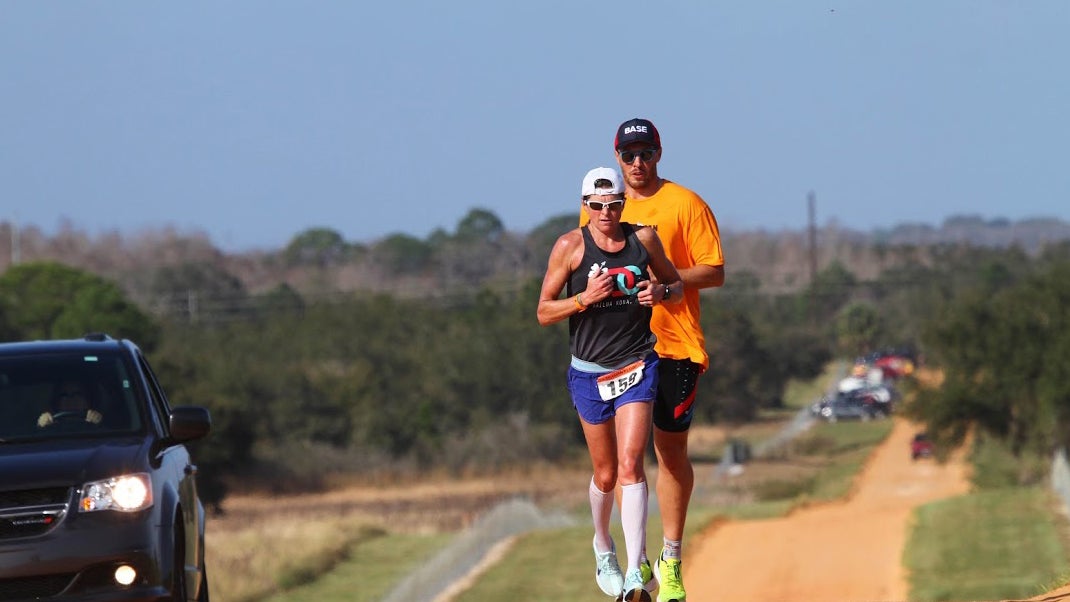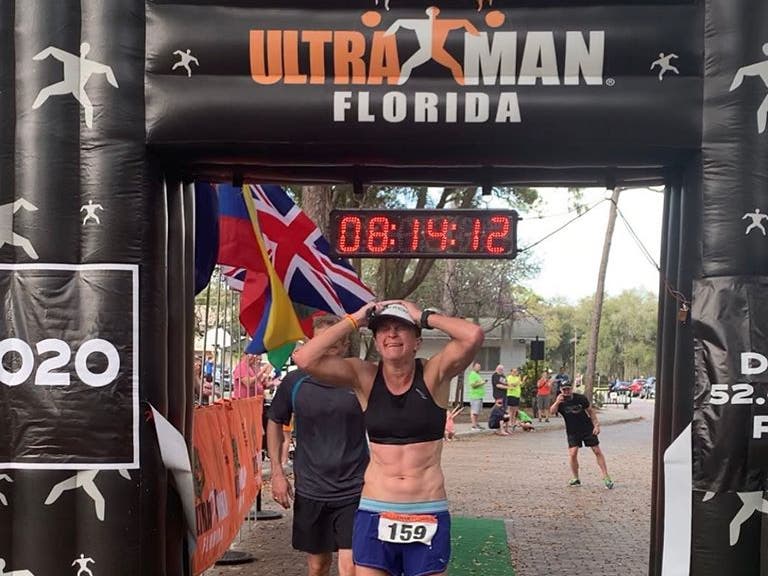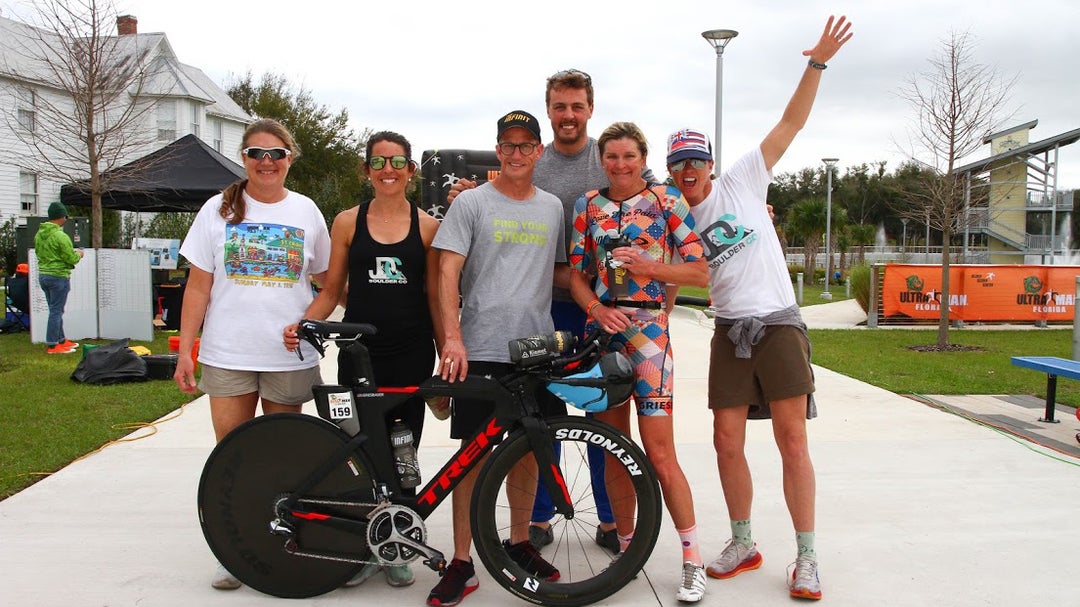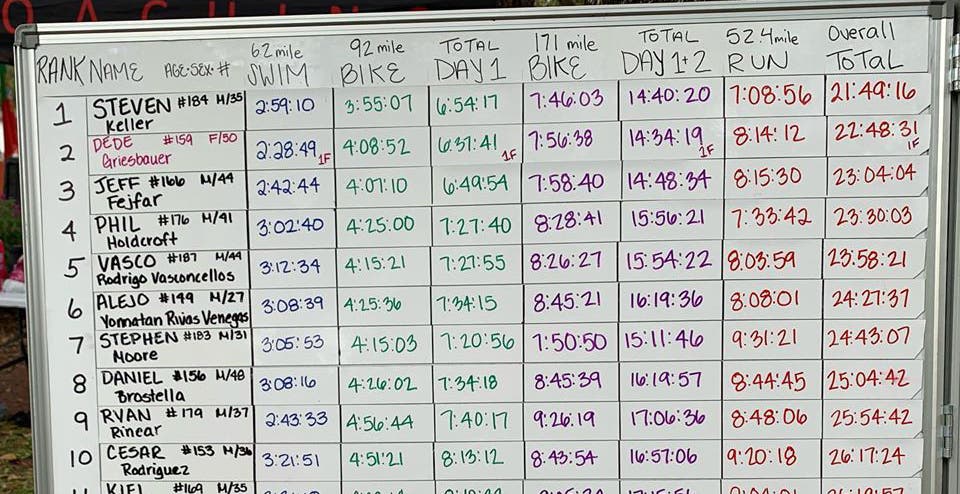Dede Griesbauer Breaks Records at Ultraman Florida

Photo: Ultraman Florida
Every time Dede Griesbauer steps on a starting line these days, one thing is certain—history will be made. As the oldest actively racing professional triathlete, 49-year-old Griesbauer often sets records just by showing up. But then the multi-time Ironman champion and top-10 Kona finisher sets other records too—like last weekend, when she took on a new challenge at Ultraman Florida and walked away with the women’s title and a new race record of 22:48:31. The time is also the fastest ever turned in by a female at an Ultraman event. Previously Amber Monforte held the record from the 2010 Ultraman World Championship, where she posed a 24:07:11.
Ultraman Florida, a three-day, 320-mile individual ultra triathlon featuring a 6.2-mile swim, 261.4-mile bike, and 52.4-mile run, was a prime display of the Griesbauer legend. After leading the men’s and women’s races for the first two days on the swim and bike, Griesbauer closed with an 8:14:12 double marathon, passed only by eventual men’s race winner Steven Keller.
The effort left Griesbauer stunned—and more than a little sore. “The adrenaline wore off this morning and I’m in a world of hurt,” Griesbauer told Triathlete the day after the race, in a way that is both a joke and also absolutely not a joke. Here’s what the newly-crowned Ultraman champ (and ever-present legend) had to say about the high and low points of the race, what crossed her mind at the finish line, and why “age is just a number” is her biggest pet peeve.

Going in, what was your goal and mindset about the race ahead?
I truly had only two goals; 1) finish and 2) don’t die. There were so many new elements to this race; three consecutive days of racing, my first 10k open water swim in a race, and the first time I’d run further than 26.2 miles. The whole thing was the great unknown, which is, in part, why I chose it. It was nice to go into a race with no expectation at all. I never once thought about time. I had no idea what course records or world records were. I wasn’t even aware they tracked such things.
My mindset was to keep things as simple as possible. I had an amazing crew with my husband Dave, UM World Champion, Jordan Bryden, my coach, Julie Dibens, my squad-mate and good friend, Katie Kyme, my strength coach, Kevin Purvis and Kris McFarland from Colorado Triathlete joined the crew to give massage. I worked really hard to train and prepare, formulated a plan for the race, communicated that plan to my crew and then totally surrendered to them once we started. I told them how things were going and then listened to them when they told me to eat, drink, slow down, speed up, etc. I give so much credit to my crew. They were amazing and made the whole thing—dare I say?—easy for me.
Did you change your preparations for this race in any way?
For the swim, only a little. We added one “long” swim a week in the build up. Typical JDCrew swims hover around 6km anyway, so once a week, I’d get in early or stay late to rack up some longer swims. The only “gap” in my preparation was that we obviously don’t have open water access in Boulder at this time of year. It would have been nice to do some long open-water swims. I have a pretty deep swim background, so I didn’t worry too much about it.
For the bike, Julie tried to replicated the back-to-back ride pattern I’d execute in the race. So most Fridays, I’d do a 3-4 hour ride with some hard efforts to zap the legs, then we’d follow that with a long (5-7 hour) more aerobic ride on Saturday where we tried to practice race nutrition. That was another struggle because it’s hard to replicate the volume of calories and fluids that would be required on race day when we’re riding in 40 degree winter weather in Boulder.
The run was tricky. I’d struggled with an Achilles niggle in August so we needed to be careful with that. We leaned on the AlterG a lot. It worked for Tim O’Donnell in Kona -good enough for me! Especially in the early stages and as the Achilles came back to full health, we also incorporated a lot of hiking to my training for added durability and time under load.
During the race, when did you suspect a world record was within reach?
Saturday night, I had a meeting with Julie; just the two of us, minus crew. She told me that if I ran—whatever the time was—I could break a world record. I immediately winced because I really didn’t want to go into the huge unknown of running 52.4 miles with any sort of “pressure” to perform. Julie immediately explained that the only reason she was telling me that was because when things got dark on day three, she wanted me to have reason to dig deeper. The possibility to do something no woman had ever done before could be a motivator in tough times. When Sunday came, though, I really put my focus back to race execution, listening to my crew, eating, drinking, and when it came to it, just holding it together. I didn’t think of the record at all.
What were the biggest factors that came into play for your stellar performance?
My preparation and my crew. No doubt. Julie also coaches Jordan Bryden who won Ultraman Canada and the Ultraman World Championship in 2019. My new strength coach, Kevin Purvis, also works with Jordan. I knew they had obviously prepared Jordan really well, so I had full confidence and trust in them.
And then the rest of my crew; people who know me well, could read me and had the experience (Julie and Jordan) to triage when things went off plan. My willingness to turn all decisions over to my crew was really important. I didn’t argue with anything they said. “Eat this.” I ate it. “Time to drink some of this.” I drank it. “We’re behind on calories, so we need to double down here.” I didn’t always want to do what they were telling me, but they were smart, thoughtful and really embraced this challenge as much as I did.
It made it all the more special to share this experience with them because they were all such a big part of the success.

Aside from the finish line, what was the high point of your race?
The whole thing was mostly really fun. I struggled in the last 12 miles of the run, of course. And there were moments on the bike on day two where things weren’t going well. But at the start of this race, I said time and time again, I really just want this to be fun for everyone. To that end, I worked hard to keep a positive mindset. I owed that much to my crew who had graciously taken time away from their own busy lives to help support me. No one wants to hear someone whine and complain about how hard it is or how tired I am. So we tried to keep a sense of humor all around and keep it light. I think we were pretty successful and had a good time with it all. It was one great three-day adventure and we all laughed a lot.
Were there any low points?
The swim ended up being much harder than expected because of the conditions. A front blew thru and while the water started off calm and flat, it finished anything but that way. During the last 3-4km, I couldn’t see buoys. I couldn’t see the shore. And at times, I couldn’t even see Julie. So to struggle that early was a bit concerning, but we got through it, thanks to Julie’s heroic kayaking skills!
Day two on the bike started a bit rough. My stomach wasn’t agreeing with the nutrition plan we’d laid out. Jordan and Julie took charged and took me off plan, introducing some things Katie had prepared that I never thought I’d ever take in on the bike. I was concerned about the changes, but as my stomach settled down and we got back on track, we worked through it. I stayed really positive, despite the vomiting and my crew was amazing to help turn things around.
The lowest of lows came with about 10km to go. Someone on my crew said “You are so close! Only 10km to go!” I think I had hit both a physical and emotional low at the same time which was a bad combination. It’s the first and only time I lashed out at my crew. I said “10km? Do you have any idea how [expletive] far that is?” I grumbled some other complaints to Katie, who was my pacer at the time and she responded with some jesting to lighten the mood; what a pro.
What went through your head as you crossed the finish line?
“THANK GOD THAT IS OVER!”
And then a whole wave of gratitude for having gotten to have such a great experience both in performance and bonding with my amazing crew and the athletes out on course. The whole thing was such a special experience, I just can’t even put it in to words. I’m just so grateful for it all.
What does a record-setting Ultraman treat herself to after the race?
I’ve been waiting for that wave of uncontrollable hunger to kick in and to indulge in some naughty nutrition. To be honest, though, I’ve struggled to eat at all. I spent most of the day yesterday “anti-eating” in fact.
The last 48 hours, I’ve really just been trying to be kind to my body, quiet my mind, and soak it all in. It truly hasn’t sunk in at all.
My crew took off for training camp the day after the race (I have serious FOMO, but I need to obviously tap the brakes for a while), so when they get back, I hope to get them all together for a celebratory evening. They were all such a big part of it and deserve so much credit.
Much ado was (and is) made about your age—what’s your take on that?
Ironically, I just did a Q&A on the topic “Age is just a number” for the Boulder Tri Club just before I left for Ultraman.
Biggest pet peeve ever when people say that age is just a number. Age is real! I train differently than I did 10 years ago, but not in the way most people think. I have to work harder, work smarter, sleep more, eat better, do more self-care, and pay way more attention to the small details than I ever had to when I was younger and I have to do it all constantly. I have to work 4 times as hard as I used to gain 10% of what I used to. Working with an aging body is hard. I’m simply willing to do the work, because I still love what I do. I absolutely think people can succeed in spite of age, but I think it is way harder because age is not just a number. It’s a reality. I have a brilliant team around me though including Julie, Kevin, and a host of body support people to keep me on track and keep swinging.
What’s next for Dede Griesbauer?
I’m trying not to get too far ahead of myself. We deliberately didn’t set any firm racing plans for the season yet because we don’t know how the recovery is going to go. I chatted with Jordan Bryden this morning from the JDCrew camp. He said, “Recovery is a bit unknown from what you just did.” He recovered really well from Ultraman Canada, but Ultraman World Champs left a bigger dent. So for now, what’s next is just a lot of recovery. Just like the race itself, we’ll take it one step at a time.
